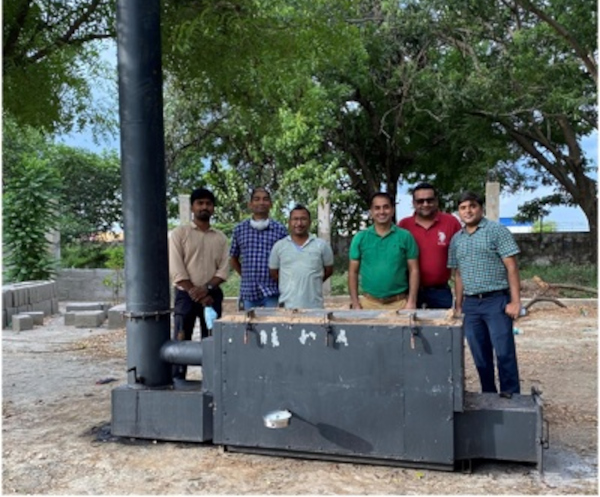Charcoal is widely used as fuel for domestic and industrial heating applications. While most of the developed countries are producing industrial charcoal through the retort system, it was not available for Indian charcoal producers because of technological barriers and the need for higher capital investment.
Now, researchers at the Indian Institute of Technology (IIT), Guwahati, have developed a novel improved natural draft charcoal retort (INDCR) to address the technological and capital investment challenges of Indian charcoal makers.
“This innovative reactor is proven to produce high-quality charcoal from a wide range of feedstock, and is designed to use its feedstock as heating fuel. The newly developed reactor is portable to agricultural fields, and it is proven to convert all the agricultural waste to charcoal without the noxious gas emissions”, Dr Senthilmurugan Subbiah, Professor, Department of Chemical Engineering, IIT Guwahati, said.
Dr Arun Kumar Chandrasekaran and Dr Senthilmurugan Subbiah, Professors in the Department of Chemical Engineering, IIT Guwahati, who were the lead innovators of the INDCR system, have filed an Indian patent for the design of this innovative reactor. The reactor’s technical detail and its performance have been published in the Energy & Fuels Journal.
Researchers from IIT Guwahati have chosen various biomasses such as Prosopis juliflora, Casuarina equisetifolia, Bambusoideae, Biomass briquettes, Wood pellets, and Refuse-Derived Fuel (RDF) briquettes from Municipal Solid Waste (MSW) as the input feedstock for charcoal making process.
Charcoal is widely used as fuel for domestic and industrial heating applications. While most of the developed countries are producing industrial charcoal through the retort system, it was not available for Indian charcoal producers because of technological barriers and the need for higher capital investment.
Good quality charcoal depends on its end-user. Hence, the retort reactor has been developed to be capable of producing charcoal in higher mass yield (34%-42%), versatile quality of fixed carbon (76%-88%), higher energy content (6400-7200 kcal/kg), minimal noxious emission (2.65 kg of CO2/kg of charcoal), and lesser carbonization time (4 hours), say researchers.
Further, the reactor can control the process at any point in time during operation. It is user-friendly in terms of loading biomass/feedstock and unloading charcoal. Upon attainment of 270°C and upward, the volatile gases produced in the wood chamber, which are mainly low molecular weight organic volatile compounds are redirected back into the combustion chamber for complete burnout and liberated as complete combustion products.
The retort system operates in an environmentally friendly way with very low emissions of Carbon Monoxide, Carbon Dioxide, Hydrocarbons, and particulate matter. Further, the charcoal produced from the retort reactor was used as a fuel in barbeque & blast furnace heating applications and as a sorbent in pharmaceutical wastewater treatment.
The developed charcoal retort reactor was installed and tested at Paramakudi, Ramanathapuram District, Tamil Nadu, with the fabrication help of M/s. Optima Heat Technologies, Tamil Nadu. The pilot-scale mobile charcoal production unit is 125 kg of input loading capacity with the two-phase model of operation. The demonstration of the whole research consumed two years with more than 60 field trials having been carried out to ensure consistent yield and quality of charcoal.
Speaking about the technology transfer agreement between IIT Guwahati and Sanron Fuel Pvt Ltd, New Delhi, and Samkitec Resources, Hyderabad, Dr Subbiah said, “This technology transfer will enable further research and development to design a higher capacity reactor for producing an industrial-grade charcoal irrespective of any input loading feedstock with a higher mass & energy yield and lower emissions.”
You may also like
-
Trade Connect E-platform For Exports Is Single Window, Fast, Accessible And Transformational: Shri Piyush Goyal
-
Dot Simplifies Approval Processes For Telecom Licenses And Wireless Equipment
-
Coal Production and Supply Trends on Positive Trajectory
-
Union Minister To Release Booklets On Promotion Of Indigenous Species & Conservation Of States Fishes
-
2nd India-Japan Finance Dialogue held in Tokyo on 6th September, 2024
